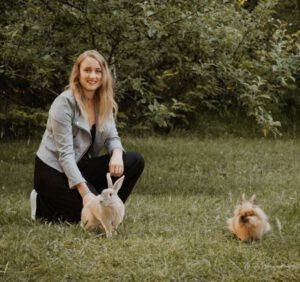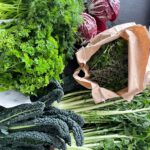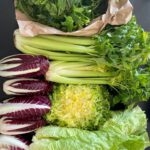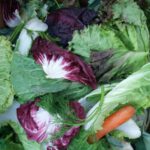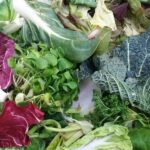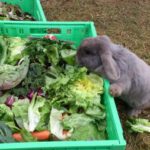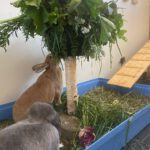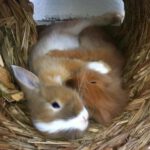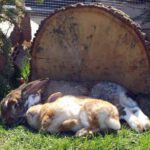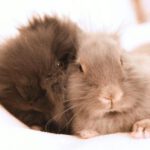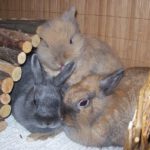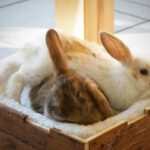Bloating, gas buildup, tympanitis
Attention: Refusal to eat is always an emergency and life-threatening for rabbits! Immediate veterinary care should be sought!
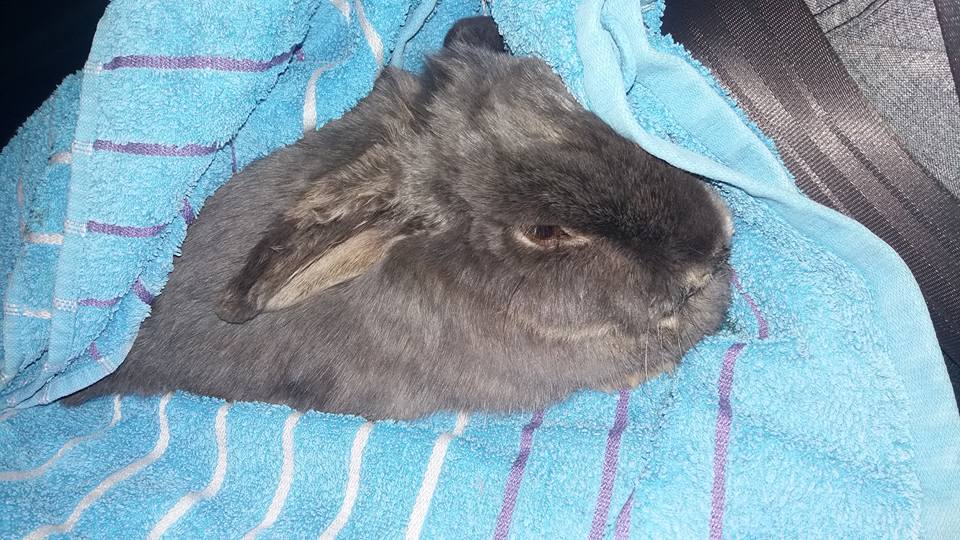
Contents
- What is bloating?
- Symptoms/Diagnosis: How can I tell if my rabbit is bloated?
- Causes: How do rabbits develop bloating?
- Treatment: What helps against bloating?
- Special Case: Cecal BloatingCauses
- Nutrition for Rabbits Prone to Bloating or During Acute Bloating to Support Veterinary Treatment
- These feed ingredients are specifically effective against bloating:
What is bloating?
Bloating refers to the formation of gases in the digestive tract. Unlike other animals or humans, rabbits are unable to burp or pass gas easily, so gases quickly accumulate in the digestive system. This can lead to discomfort and serious health issues if not addressed.
Symptoms/Diagnosis: How can I tell if my rabbit is bloated?
Affected rabbits are usually lethargic (apathetic), eat less or refuse food altogether, and often remain in the same spot, not moving as they usually do. They may appear rounded and „puffed up.“ Sometimes, bloating can be visible in the abdomen (though this is not always the case), and many rabbits become sensitive when their abdomen is palpated. Only a veterinarian can make an accurate diagnosis by taking an X-ray, as other diseases can present with similar symptoms.
Important: Insist on an X-ray with your veterinarian, as this is the only way to reliably diagnose bloating. It cannot be diagnosed through palpation alone!
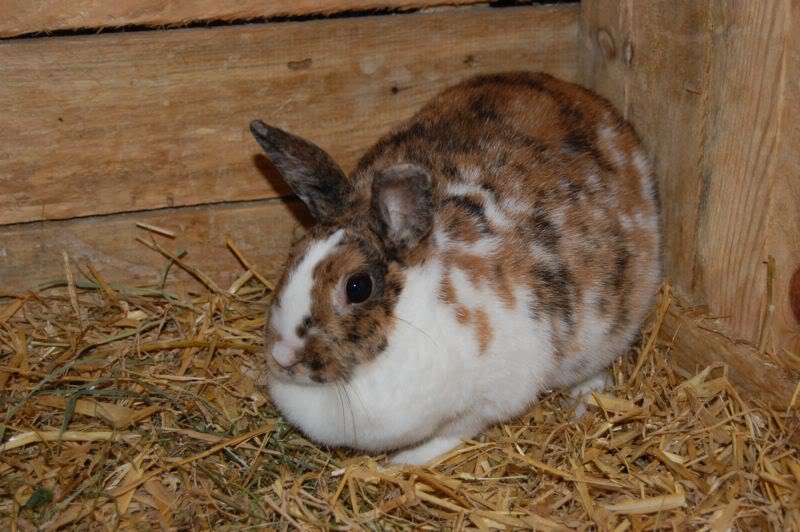
Causes: How do rabbits develop bloating?
- When a rabbit’s stomach or intestines become bloated, it is a malfunction in the digestive system, which is caused by underlying factors. These causes should always be investigated to prevent further health issues.
- One cause can be the feeding of large amounts of unfamiliar food, especially dry or unhealthy food. Offering such food in unfamiliar quantities can quickly lead to bloating. If rabbits are fed an unhealthy dry food diet, they may also react to fresh food with bloating. Bloating is particularly common in spring when owners enthusiastically gather fresh greens for their rabbits and suddenly offer them in large quantities to animals that have been fed dry food for months.
- Spoiled, unsuitable, moldy, or heavily pesticide-contaminated food can also cause bloating. When rabbits have a wide selection of food, they tend to avoid old or wilted food. If your rabbits are eating such food, please significantly increase the amount of fresh food.
- Bloating is often associated with yeast, coccidia, giardia, E. coli bacteria, or an intestinal infection. Infections and parasites in the intestines can disrupt digestion and contribute to bloating. If your rabbits frequently suffer from bloating, coccidia are often the underlying cause. Therefore, it is essential to have a stool sample examined for parasites over three days if your rabbit is experiencing digestive problems.
- For many rabbits, the gut flora is incomplete due to antibiotic use, incorrect feeding, or early separation from the mother, making them more sensitive to digestive issues. A healthy diet can help restore balance.
- Dental problems (which can also be caused by poor nutrition or be congenital) can lead to bloating, as insufficiently chewed food enters the digestive tract and adds extra stress to it.
- Mold in the living environment or food:
- Unfortunately, the feeding of dry food is still widespread. Even seemingly healthy dry food (or hard bread, chew sticks, or treats) that is marketed as grain-free or healthy can harm the digestive system and promote digestive problems. A sick digestive tract quickly becomes „overwhelmed“ and struggles to process the food. As a result, some components are not properly digested and begin to ferment. A dry and energy-dense diet is one of the most common causes of bloating. Commercial dry foods (even „grain-free dry food,“ dried vegetables, hard bread, treats, and other dry food) slow digestion because they quickly make the rabbit feel full (high energy density and swelling ability—food swells when it comes into contact with stomach acid and increases in volume). The dry food overfills the stomach and somewhat dehydrates it, leading to very slow digestion or even a complete stoppage. Little to no new food is consumed (the rabbit is full and „overloaded“), so no new food material is pushed through the digestive tract. The pyloric sphincter (the valve between the stomach and intestines) often does not open properly when dry food is in the stomach, as it remains closed until the food is adequately moistened. This stagnant food in the stomach is very dangerous, as gases can form during fermentation, and since rabbits cannot burp, the stomach quickly bloats. The same can happen with the intestines, which may also stop functioning and become bloated.
- Bloating can also occur if the rabbit is eating little or nothing due to another illness, as the food remains stagnant in the stomach or intestines. This often happens with conditions like constipation or hairballs. This is, by far, the most common and dangerous cause!
- Long periods between meals or overeating can also contribute to bloating. Make sure to offer your rabbits fresh greens multiple times a day, allowing them to eat at a steady pace throughout the day and night.
- Lack of movement can worsen bloating, so it’s helpful for rabbits to move around a lot, which stimulates digestion. A species-appropriate living environment with plenty of space (also at night) helps prevent bloating.
Important: Many veterinarians claim that feeding cabbage causes bloating. This is not true! Rabbits that are fed a healthy diet can tolerate cabbage in large amounts without any issues. If cabbage causes problems, it is usually due to the feeding of pellets or other unhealthy food that strains the digestive system and may lead to intolerances to cabbage, grass, and other fresh foods.
Treatment: What helps against bloating?
Important: Always seek a veterinarian who specializes not only in small animals (dogs & cats) but also in small pets (rabbits and rodents)!
Only veterinarians with targeted training in exotic or small pets can properly treat rabbits, as they are only covered as a marginal topic during general veterinary studies.
In case of suspected bloating, emergency medication such as 7-10 drops of RodiCare akut (available online or from your veterinarian) 3 times a day, mixed with 0.5-1 ml of Sab Simplex or Dimeticon per kilogram of body weight (available at pharmacies or online) can be helpful. These medications, if administered in time, can save lives and are not harmful when given once, nor can they be overdosed. After administration, it is essential to visit a veterinarian. A vet visit is crucial for acute bloating cases, as only a veterinarian can determine if it is truly bloating. Bloating can quickly lead to circulatory failure in rabbits, which can sometimes be fatal. For more information on first aid and treatment, you can read here: Gastric dilation.
Special Case: Cecal Bloating
Causes
- Coccidia
- Disruption of the bacterial flora due to various causes (bacterial enteritis)
- Obstruction (rare) caused by a bezoar
Treatment
The first priority should be shock therapy (infusions, warmth, possibly oxygen) and the treatment of sepsis (antibiotics).
- Warming in case of hypothermia
- Antibiotics intravenously, not orally (Metronidazole, Enrofloxacin) to stop the bacterial imbalance
- Anti-nausea medication and substances to stimulate gastrointestinal movement should be given. Metoclopramide (MCP 0.2-1mg/kg, 1-3 times daily; caution: do not use MCP longer than three days, if necessary, gradually taper off). The effectiveness of MCP is not scientifically proven, and Cisapride does not work in rabbits.
- Proven effectiveness with Lidocaine infusions (100 μg/kg/min intravenously over two days) and Mirtazapine (3 mg/kg, once daily).
- Pain relief intravenously, not orally (e.g., Metamizole (Novalgin))
- Massages and movement
- Feeding support
- Lactulose
- After stabilization, Coccidia treatment if needed.
Nutrition for Rabbits Prone to Bloating or During Acute Bloating to Support Veterinary Treatment
There are rabbits that tend to suffer from bloating due to previous improper feeding. Naturally, the first step should be to adjust their diet. A diet consisting of unlimited fresh greens (preferably from the wild) is the best choice for rabbits prone to bloating, as it helps to evenly regulate and load the digestive system. Any form of grain and processed foods (such as dry food, pellets, or mixed feeds) should be gradually eliminated. Ready-made foods of any kind are not recommended due to their digestion-damaging effects and problematic ingredients.
These feed ingredients are specifically effective against bloating:
Aromatic herbs: Dill, peppermint, lemon balm, basil, parsley, thyme, oregano, sage, chives, wormwood, lovage, lavender, nettle
Wild and meadow herbs: Cow parsnip, dandelion, oak bark and leaves, wild garlic, chamomile, willow catkins and branches, yarrow, chicory
Seeds: Dill seeds, fennel seeds, caraway seeds, aniseed
Vegetables: Fennel, ginger
Sources:
Böhmer, E. (2005): Röntgenologische Untersuchung bei Hasenartigen und Nagern (Schwerpunkt: Magen-Darm-Trakt, Harntrakt, Wirbelsäule). Tierärztliche Praxis Ausgabe K: Kleintiere/Heimtiere, 33(02), 115-125.
Böttcher, A. (2017): Untersuchungen zur Magendilatation bei Heimtierkaninchen (Oryctolagus cuniculus) (Doctoral dissertation, Freie Universität Berlin).
Cheeke, P. R., Cunha, T. J. (2012): Rabbit feeding and nutrition. Elsevier.
Drescher B. (2014): Magenüberladung beim Kaninchen. Kleintier konkret 2: 12–16
Eckert, Y. (2020): Stillstand: Der Ileus beim Kaninchen. kleintier konkret, 23(S 01), 2-10.
Feldman, E. R., Singh, B., Mishkin, N. G., Lachenauer, E. R., Martin-Flores, M., & Daugherity, E. K. (2021): Effects of Cisapride, Buprenorphine, and Their Combination on Gastrointestinal Transit in New Zealand White Rabbits. Journal of the American Association for Laboratory Animal Science.
Harcourt-Brown, F. M. (2007): Gastric dilation and intestinal obstruction in 76 rabbits, Veterinary Record 161, 409-414
Harcourt-Brown (2007): Gastric dilation and intestinal obstruction in 76 rabbits. Vet Rec 161 (12): 409–414
Harcourt-Brown TR. (2007): Management of acute gastric dilation in rabbits. J Exotic Pet Med. 16 (3): 168–174
Hein, J. (2009): Anorexie beim Kaninchen–diagnostische Aufarbeitung und erster therapeutischer Ansatz. Tierärztliche Praxis Ausgabe K: Kleintiere/Heimtiere, 37(02), 129-138.
Hein, J. (2016): Notfälle beim Kleinsäuger – erkennen und reagieren.
Hein, J. (2018). Röntgenbildinterpretation Magen-Darm-Trakt Kaninchen. kleintier konkret, 21(S 01), 12-20.
Kreis ME, Jauch KW. (2006): Ileus aus chirurgischer Sicht. Differenzialdiagnose und therapeutische Konsequenzen. Chirurg. 77 (10): 883–888
Köstlinger, S. (2014): Notfälle beim Kaninchen. kleintier konkret, 17(S 02), 2-7.
Lichtenberger M, Lennox A. (2010): Updates and advanced therapies for gastrointestinal stasis in rabbits. Vet Clin North Am Exot Anim Pract. 13 (3): 525–541
Nickel, R., Schummer, A., & Seiferle, E. (2004): Lehrbuch der Anatomie der Haustiere—Band II Eingeweide. Parey, Stuttgart.
Müller, K. (2014): Magendilatation beim Kaninchen–Was ist zu tun? kleintier konkret, 17(02), 16-20.
Ozawa, S., Thomson, A., & Petritz, O. (2022): Safety and efficacy of oral mirtazapine in New Zealand White rabbits (Oryctolagus cuniculus). Journal of Exotic Pet Medicine, 40, 16-20.
Schnabl, E., Böhmer, E., & Matis, U. (2009): Diagnostik und Therapie des Magenbezoars beim Kaninchen: katamnestische Betrachtung von 39 Patienten. Tierärztliche Praxis Kleintiere, 37(2), 107-113.
Schnabl, E., Böhmer, E., & Matis, U. (2009): Diagnostik und Therapie des Magenbezoars beim Kaninchen: katamnestische Betrachtung von 39 Patienten. Tierärtzliche Praxis, 37, 107-113.
Schnellbacher, R. W., Divers, S. J., Comolli, J. R., Beaufrère, H., Maglaras, C. H., Andrade, N., … & Quandt, J. E. (2017): Effects of intravenous administration of lidocaine and buprenorphine on gastrointestinal tract motility and signs of pain in New Zealand White rabbits after ovariohysterectomy. American journal of veterinary research, 78(12), 1359-1371.
Varga M. (2014): Textbook of Rabbit Medicine. 2nd ed. London: Butterworth-Heinemann Elsevier


